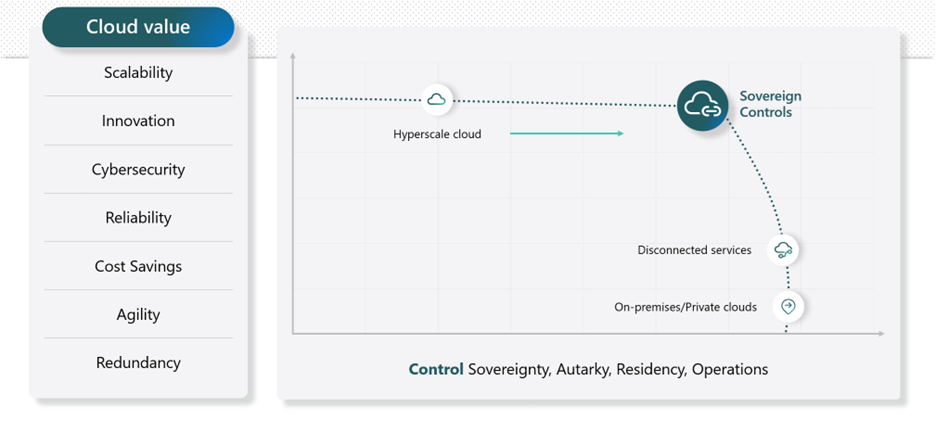Note
Access to this page requires authorization. You can try signing in or changing directories.
Access to this page requires authorization. You can try changing directories.
As governments today look at innovation in technology, there's a need to address the rapidly evolving demands of their citizens while protecting sensitive data and delivering on promises of trust and security. Modernization of government services without compromising security, digitization of manual processes, and improved user experiences for both citizens and government employees are all benefits of digital transformation. Governments know that the right technology platforms can create even better opportunities for social and economic growth.
Sovereignty can mean many things in different contexts. Within the context of Microsoft’s approach to data sovereignty, we give government customers full control over their data. The control may include data residency within regional boundaries and tools to ensure control of who has access to their data.
Data sovereignty is critical for governments to:
- Protect government data from security breaches and malicious activity.
- Maintain government data confidentiality to protect privacy.
- Protect government data against unauthorized access to data.
- Secure government data to prevent negative business and financial impact.
Sovereignty in the public cloud
It's a challenge for governments to embrace digital innovation while ensuring digital sovereignty. Investing in a private, isolated on-premises datacenter might, at face value, seem to be the only way to achieve the level of control and security a government requires. But building on a private cloud requires them to maintain on-premises datacenters, which are no longer viable due to their inability to scale and deliver the security and functionality that the cloud provides. Since governments operate under increasingly restrained resources and shrinking budgets, Microsoft Cloud offers governments the ability to operate on a leaner budget, compared to on-premises datacenters. Migrating to the cloud enables governments to take advantage of the agile benefits of the cloud and focus their spending on the latest innovations in the delivery of services.
Technologies today are born cloud-first and many of the latest advancements in hardware and software to support data analytics, AI, blockchain, and digital identity, wouldn’t exist without the cloud. Governments that adopt the cloud benefit from these innovations and change how governments operate, while governments that still maintain or expand their private cloud investments may not benefit from the same growth and innovation.
Public cloud technologies offer agility, scalability, and flexibility, advanced cybersecurity features, and access to the latest innovations, including AI, to accelerate digital transformation and the delivery of essential public services. Many governments and regulated industry companies want to take advantage of these benefits of the public cloud while also managing data in accordance with their local policies and regulatory requirements. To feel comfortable using the public cloud, these customers need solutions that ensure digital sovereignty, giving them control over their data in the cloud.
We believe it’s critical that sovereign capabilities are provided in the public cloud to maximize the benefits to governments and regulated industries around the world. Customers desire a move to the cloud so that they can realize the value that it brings in increased scalability, reliability, agility and security. Whereas, what is holding them back from adopting the cloud are the controls that keep their data safe today in private or disconnected environments, like physical sovereignty, autarky, residency, and local operations.
Microsoft Cloud offers sovereign capabilities, which provide the necessary control without trading off cloud value.
The public, hyperscale cloud can deliver a range of control while providing desirable cloud value. Disconnected services and on-premises private clouds deliver a lot more control, but at the cost of a tremendous drop in cloud value. The tradeoff exists on an underlying curve where you can preserve cloud value only up to a certain point of control. Beyond that point of control, the cloud value diminishes rapidly.
For more information, see, Why use Microsoft public cloud for Sovereignty?
The public cloud controls and capabilities to build sovereign solutions are available today. Our partners can immediately get government customers started on their digital transformation, but it's a hard problem to solve.
